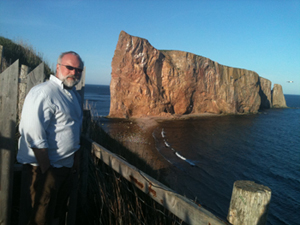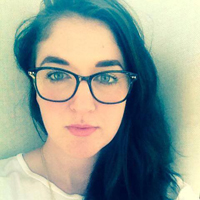Written From the Moon:
Rachael Kearley in Conversation with Mark Anthony Jarman

Malahat volunteer Rachael Kearley talks about sense of place, displacement, and writing on the road with writer Mark Anthony Jarman, one of three judges for our upcoming 2016 Novella Prize.
In your opinion, what differentiates the novella form from the short story or the novel? What are you looking for in this competition?
I hope I’m open in terms of what we’re looking for. As Atwood says, art is what you can get away with. Obviously the novella fits a pleasing range between a story and a novel. I’ve taught Time’s Arrow by Martin Amis and Conrad’s Heart of Darkness and they are a good length for a class list. In the summer of 2014 I was traveling a lot, from Croatia up to Vienna and Poland, and I had a very rough draft of a story I was working on as I traveled, often by train; the piece ended up being much longer than any of my previous stories, perhaps 70 pages. It was published in Doug Glover’s fine on-line journal, Numero Cinq; it was to be part of my book Knife Party at the Hotel Europa, but I knew I would have trouble placing a story that long in a print mag. So this contest is a good chance to do just that.
You mention how difficult it can be to get a novella-length story published in a journal. Is the best opportunity for writers with such stories to look for competitions like this one? What do you think it would take for a literary journal to publish stories of this length? Should writers of the novella be looking to get published in installments or save these stories for a collection?
It is difficult to find a home for longer pieces, but at The Fiddlehead we try to publish some longer pieces, for example Steven Heighton in the current issue, but it means we end up with less stories or authors in an issue. Prairie Fire seems open to longer pieces, which I like. I also like the idea of installments over more than one issue. I have to say to never just save it for a later book; I am perhaps obsessed with getting most of a book out in stories or pieces in journals or sites. Sometimes I send shorter versions of a long piece.
In your latest collection of stories, Knife Party at the Hotel Europa, you have such a specificity of place. The details are extraordinary. The sense of place feels very grounded in Italy, even when the characters feel adrift. Is this something you value in literature? Do you think a sense of place can be created if the author has never travelled there?
I am not an expert on Italy, but collected what I could while there on trips and then scoured papers and magazines and books for details that I could use, for example the pasta called Strangled Priests from an article on food; had to give that to my character Eve. But yes, a writer can fake it very easily. My story, “My White Planet,” is set in the far north on a radar station and I know very little about such a place; you can suggest an era or a locale with very few details. I wrote a story set on the moon with the idea that it wouldn’t be that different than people going to work in a place like Fort Mac.
I’m sure Fort Mac can feel like being as far away as the moon sometimes. The stories in this collection are about leaving Canada, about displacement, but also finding oneself in new, foreign surroundings. These must come from a place of personal experience. Some of the stories are quite raw. Did you write these while travelling? Is your experience writing overseas different than the way you would write in a familiar environment?
Fiction, nonfiction: I don’t worry too much about such distinctions. I wrote some of the Italian material while traveling, and some was personal, but later I really work it over at home and I add a ton over time; it changes shape very much from draft to draft. I agree about writing in an unfamiliar environ; I write far more about a short trip to Italy or California than I do about a year at home; something in your eye changes, you see things differently than at home. I enjoy that about travel.
Of course, I have to ask, what books are currently on your desk? I imagine there are journals or publications you find yourself constantly returning to?
My desk is a mess. Right now I can see several books to do with Trieste, Croatia, and Bosnia, because I traveled there recently and want to know more and I’d like to write a story set in Zagreb; it’s just such a great sounding name. I tried to look again at Finnegan’s Wake (Joyce lived in Trieste), but I can’t get going. I’m a fan of James Salter and Denis Johnson and often go back to them. Transformations by Anne Sexton is there because I wanted to look again at her use of folk tales. There are also a few anthologies, Granta, O. Henry prize Stories, Best American Travel Writing 2011, an old anthology of stories about work. I like such collections. There are also some books on the Gaspé Peninsula as I want to write a travel book about that beautiful place.
As a teacher of writing, what do you find the most rewarding? Do you find your students help drive your work?
Teaching is a pretty good gig; today I was teaching T.S. Eliot’s “Prufrock,” a very sad poem, but we were laughing because I realized in the middle of class that he is like George on Seinfeld. And CW workshops are often very social, you become friends, go for a beer, talk of writers, TV shows, new bands, etc. I started reading Steven Milhauser because a student spoke of his stories. It beats breaking rocks.
Do you have a writing routine? I have heard over and over again how crucial that is to a writer’s productivity.
I don’t follow a routine, but have found that small bits add up over the years, whereas nothing adds up to nothing. I am a bit compulsive, I collect all the time. I have notebooks galore and piles of scraps of paper, photos, postcards, beer labels, café napkins, etc. But there are times I don’t write much, say when out promoting a book, and other times I binge, say for a looming or blown deadline. I’m a believer in recharging the batteries with a break, but a routine is good for many people. I’m supposed to work on my Gaspé book, but this moment I am drawn back to my Wild West novel that I put aside in 2008 to work on my collection, Knife Party at the Hotel Europa. And I want to write something about Zagreb and my time in Iowa, where I did my MFA.

Rachael Kearley
* * * * * * * *
Read full guidelines for the 2016 Novella Prize.









